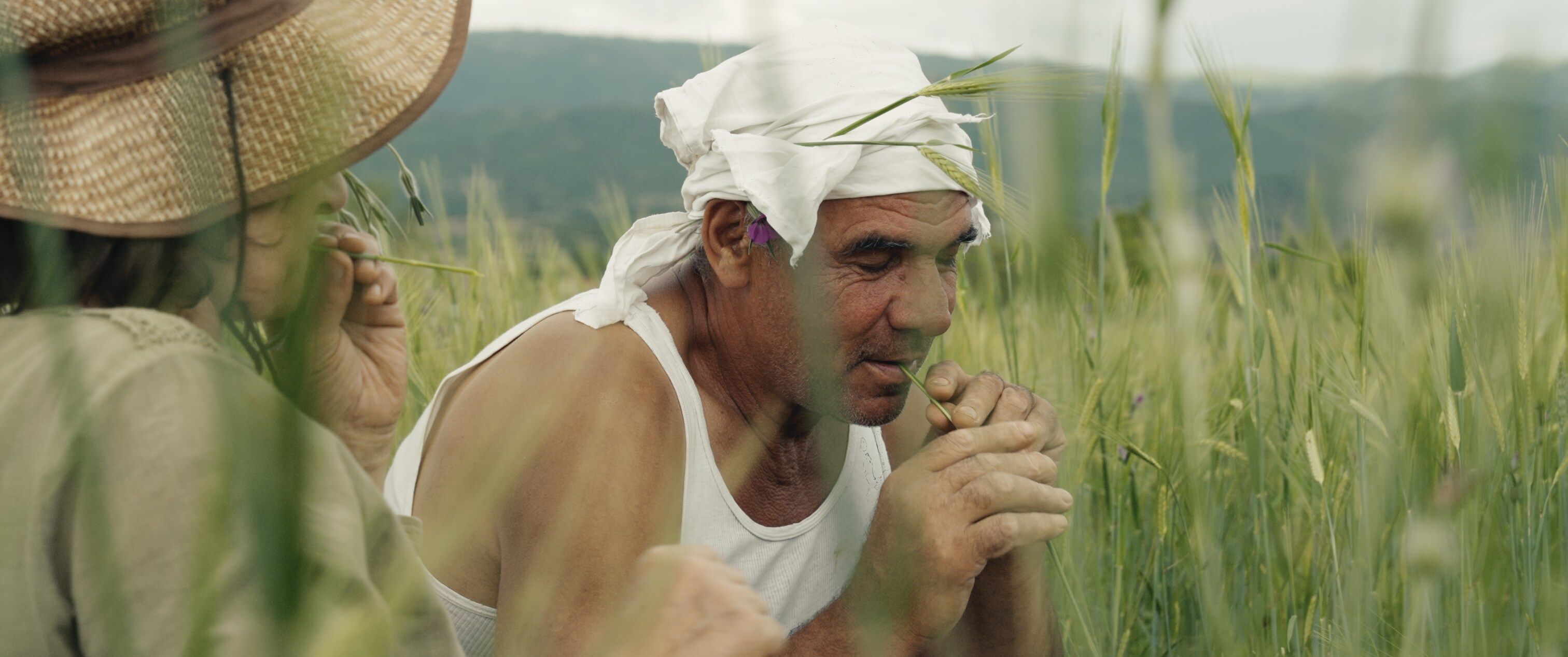
The small farming village of Češinovo in Macedonia is home to the country’s largest population of white storks. These birds thrive alongside the farmers, benefiting from the fertile land. Filmmaker Tamara Kotevska draws on a traditional Macedonian story of a father and son to create a powerful film about the challenges faced by farmers today – including the pressures of capitalism and climate change – and the importance of finding a better balance between people and the natural world.
Filmmaker Tamara Kotevska, known for her 2020 documentary Honeyland – a groundbreaking film nominated for both Best Documentary and Best International Film at the Oscars – returns to the issue of balancing environmental needs with financial gain. Her new film focuses on Nikola, a cheerful 60-year-old farmer who has spent 45 years cultivating his land with his wife, Jana. They grow a variety of crops, including potatoes, tobacco, watermelon, peppers, cabbage, and tomatoes, and consistently have successful harvests. However, they struggle financially due to unfair practices from buyers and sellers in the marketplace, meaning even record yields don’t translate into sufficient income.
The Tale of Silyan Slyly Tells Multiple Allegories In One
The story of Silyan tells of a boy who rejects his duty to provide for his village. Angered by this refusal, his father curses him, turning him into a stork to avoid seeing his face. Immediately, lightning strikes and the transformation is complete. Unable to communicate as a human, Silyan silently helps his grieving father work the farm, using his beak to assist. In Kotevska’s film, Nikola faces a similar loss – his son has left for the city – but his greater struggle is adjusting to a world where his traditional farming skills are no longer needed.
The movie is most powerful when it lets its visuals tell the story. A good example is the scene where Nikola and his neighbor search the land with a metal detector, hoping to find gold – it’s a futile effort, like searching for food in an empty refrigerator.
It really got to me when Nikola’s family had to move to Germany for a better life – it’s heartbreaking to see how that affected everyone, and the neighbors even protested, feeling abandoned by the government. Nikola was torn, wanting to provide for his family but also feeling responsible for the land he loved. He put off selling for as long as he could, but eventually had to. The movie has this beautiful voiceover that shows Nikola regretting leaving, while also missing the simple things, like seeing his son reflected in the storks that still visit. What really struck me is how the director, Kotevska, subtly shows us that people and animals aren’t so different – we live alongside each other, but often don’t realize it. Nikola and his family started noticing how much like us the storks were – building nests, sharing food, looking after their young. But it wasn’t until a stork with a broken wing showed up needing help that Nikola really started to see them as neighbors, as something more than just birds.
Given the film’s roots in real events and the director’s interest in mystical themes, The Tale of Silyan sometimes feels torn between telling a fictional story and presenting a documentary. This uncertainty occasionally makes it hard for the film’s allegorical, almost Biblical, message to come across clearly. The film is strongest when it lets its images speak for themselves, like the scene of Nikola and his neighbor fruitlessly searching for gold with a metal detector – a desperate act, similar to searching for food in an empty refrigerator. Another powerful moment shows farmers protesting by dumping three tons of potatoes – their family’s entire harvest – onto the road, effectively blocking access with the very fruits of their labor.
One of the most striking scenes shows Nikola operating an excavator at a landfill, where he sadly observes storks scavenging for food amongst the trash. At the same time, his neighbors find it more profitable to burn their fields and trees than to farm them, relying on insurance money instead. While the film concludes with a hopeful outlook for the farmer and his relationship with his son, a sense of underlying pessimism remains. To ensure our world’s survival in the face of growing inequality and widespread pollution, we may need to address multiple problems simultaneously. We must embrace our changed circumstances, as Silyan does, demonstrate Nikola’s resilience, and maintain the essential connections with each other, like the storks.
Read More
- All Golden Ball Locations in Yakuza Kiwami 3 & Dark Ties
- NBA 2K26 Season 5 Adds College Themed Content
- All Itzaland Animal Locations in Infinity Nikki
- Elder Scrolls 6 Has to Overcome an RPG Problem That Bethesda Has Made With Recent Games
- Hollywood is using “bounty hunters” to track AI companies misusing IP
- What time is the Single’s Inferno Season 5 reunion on Netflix?
- Exclusive: First Look At PAW Patrol: The Dino Movie Toys
- Unlocking the Jaunty Bundle in Nightingale: What You Need to Know!
- BREAKING: Paramount Counters Netflix With $108B Hostile Takeover Bid for Warner Bros. Discovery
- EUR INR PREDICTION
2025-11-24 23:00